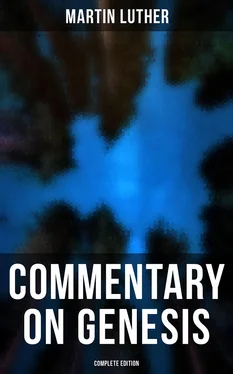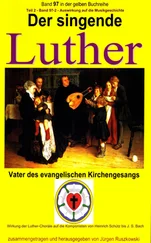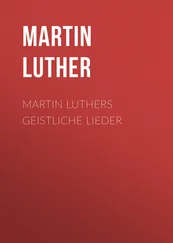Martin Luther - Commentary on Genesis (Complete Edition)
Здесь есть возможность читать онлайн «Martin Luther - Commentary on Genesis (Complete Edition)» — ознакомительный отрывок электронной книги совершенно бесплатно, а после прочтения отрывка купить полную версию. В некоторых случаях можно слушать аудио, скачать через торрент в формате fb2 и присутствует краткое содержание. Жанр: unrecognised, на английском языке. Описание произведения, (предисловие) а так же отзывы посетителей доступны на портале библиотеки ЛибКат.
- Название:Commentary on Genesis (Complete Edition)
- Автор:
- Жанр:
- Год:неизвестен
- ISBN:нет данных
- Рейтинг книги:4 / 5. Голосов: 1
-
Избранное:Добавить в избранное
- Отзывы:
-
Ваша оценка:
- 80
- 1
- 2
- 3
- 4
- 5
Commentary on Genesis (Complete Edition): краткое содержание, описание и аннотация
Предлагаем к чтению аннотацию, описание, краткое содержание или предисловие (зависит от того, что написал сам автор книги «Commentary on Genesis (Complete Edition)»). Если вы не нашли необходимую информацию о книге — напишите в комментариях, мы постараемся отыскать её.
Commentary on Genesis is the last work of Martin Luther, written during the last several years of his life. Luther's work follows the first volume of Psalms with critical and devotional remarks on the creation and on sin and the flood.
Commentary on Genesis (Complete Edition) — читать онлайн ознакомительный отрывок
Ниже представлен текст книги, разбитый по страницам. Система сохранения места последней прочитанной страницы, позволяет с удобством читать онлайн бесплатно книгу «Commentary on Genesis (Complete Edition)», без необходимости каждый раз заново искать на чём Вы остановились. Поставьте закладку, и сможете в любой момент перейти на страницу, на которой закончили чтение.
Интервал:
Закладка:
A question here also raised concerning mice and doormice; whence and how they originate and are generated. For we find by experience that not even ships, which are perpetually swimming on the ocean, are free from mice, and no house can be thoroughly cleared of mice but that they will still be generated. The same inquiry may be instituted concerning flies. And also whither birds go in the time of autumn.
If you ask Aristotle concerning mice, his argument is that some animals are homoigena , "generated from a like kind," and others, heterogena , "generated from a different kind," and that mice are "heterogena," because mice, he says, are not generated from mice only, but from putrid matter; the putridity of which is consumed and gradually becomes a mouse.
If you ask by what power this generation is effected, Aristotle answers that the putrid humidity of this matter is cherished, generatively, by the heat of the sun; and that by this process a living animal is produced; just as we see the bluebottle fly generated from horse-manure. But this reasoning is far from satisfying me, for the sun warms all things, but generates nothing, unless God speak it into being by his divine power. Even supposing therefore that the mouse were generated from putrid matter, yet the mouse would be a creature of divine power.
The mouse is therefore a creature of the divine Word and power; and it is, as I believe of an aqueous nature. Were it not a creature of the divine Word and power, it would have no natural form nor would its species be preserved. Whereas it has a form the most beautiful, in its kind; legs of such exquisite symmetry, hair so smooth, as to make it evident that it was created for a certain order of creatures by the Word of God. In the mouse therefore we admire also the creature and the workmanship of God. And the same may as certainly be said of flies.
Concerning the disappearing of birds I have no certain knowledge. For it is not very likely that they retire into regions farther south. Indeed the miracle concerning swallows is known by experience, that they lie as dead in the waters during the winter, and revive at the approach of summer; which fact is indeed a great similitude and proof of our resurrection. For these are operations of the divine Majesty truly wonderful. Hence we see them, but we understand them not. And my belief is that although a single swallow may appear unseasonably, now and then, I doubt however whether it ever can be the case, such swallow is restored from its death-like state by God himself.
Unto the creation work of the fifth day therefore belong all crawling, creeping and flying creatures; and all other creatures which move in any way in the air or the water.
III. V. 21b and 22. And God saw that it was good. And God blessed them.
Why did not God pronounce the Word of blessing upon the above inanimate bodies of his creation also? In those cases he only said, that the bodies which he had created pleased him, but he did not bless them. But when he comes to the generation and propagation of living bodies, then he institutes a new mode of their increase and multiplication. Hence the sun and the stars, as we see, do not generate from themselves bodies like unto themselves. But herbs and trees have this blessing upon them, that they grow and bring forth fruit. Still there is nothing in them like unto this present blessing, pronounced by God upon the living bodies.
Moses therefore by this Word of the divine blessing makes a glorious distinction between the bodies before created, and these living bodies which were created on the fifth day, because here a new method of generation is instituted. For in this case from living bodies are generated separate kinds of offspring which also live. But this certainly is not the case with trees nor herbs; for unless they be sown anew they bear no fruit, nor does a seed grow simply from a seed, but from a plant. But in the present instance a living body is generated from a living body. This latter operation therefore, that animal bodies should increase and be multiplied from bodies of their own kind, is entirely another and a new work of God. Because a pear-tree does not produce a pear-tree but a pear. But in the latter case, that which a bird produces is a bird. That which a fish generates is a fish. Marvellous indeed and numberless is the multiplication of each species and infinite the fecundity, but it is greatest in marine and aquatic animals.
What then is the cause of this wonderful and admirable generation or propagation? The hen lays an egg; she cherishes it until a living body is formed in the egg, which at length the hen hatches. Philosophers allege the cause of all this to be the operation of the sun and the heat of the hen's body. I fully grant all this. But divines speak much nearer the truth, when they affirm that the whole generative process takes place by the effective operation of the Word, here spoken by God, "And God blessed them; and said, be fruitful and multiply." This Word of God's blessing is present in the very body of the hen and of all living creatures; and the heat by which the hen cherishes the egg is essentially and effectively the heat of the Word of God; for without this Word the heat of the sun or of the body would be utterly ineffectual and useless.
Wherefore to this admirable part of his creation work God adds his peculiar blessing in order that these living bodies now created on the fifth day might be fruitful. From these circumstances may be seen what this divine blessing is, namely, multiplication. Now when we bless we can effect nothing. All we can do is to pray. But this prayer is inoperative. We cannot effect the things for which we pray. But the blessing of God carries with it actual fruitfulness and multiplication. It is at once effectual. On the contrary the divine curse is non-multiplication and diminution. And the curse is also at once effectual.
Here again, the phraseology of Moses is to be carefully observed. What Moses calls the blessing of God, philosophers call fecundity; that is, when certain living and sound bodies are produced from other living and sound bodies. Nothing resembles this in trees, for a tree does not generate the like unto itself; it is the seed that produces the like of the tree. This is a great and marvellous miracle, but like all things else in the wonderful works of God, it loses its wonder from our being always accustomed to behold it without reflection or consideration.
Another question here arises concerning worms and various hurtful creeping things; reptiles as toads; and venomous flies and also butterflies. In all these living creatures there is a wonderful fecundity. And it is singular that the more hurtful the creatures the more prolific generally is their generation and the greater their multiplication. But we will leave this question to our subsequent comments on the third chapter of this book. For my belief is that at the time of creation, now under consideration, none of these venomous, hurtful or annoying creatures as yet existed. I believe that they afterwards sprang from the earth, when cursed by God as the punishment of sin, that they might afflict us and compel us to flee unto God in prayer. But more on this subject, as I have just intimated, hereafter.
Thus have we then a sight of the living bodies created on the fifth day. And we have seen that the Word of God, spoken on this day, is still effectual; for fishes are still generated from mere and very water. Hence fish-ponds and lakes still generate fishes. Minnows are generated in fish-ponds, in which there were none before. For I see no likelihood of truth in the trifling arguments of some, who will have it that fishes caught by birds, drop their seed into fish-ponds and lakes, while they are being borne along in the air by their feathered captors; and that such dropped fish-seed afterwards increases and furnishes the ponds. I believe therefore the true and sole cause of all this generation and multiplication of fishes, to be God's commanding Word to the water on the fifth day of his creation work to bring forth fishes. I believe that this divine Word is still effectual; and that it still works all these things!
Читать дальшеИнтервал:
Закладка:
Похожие книги на «Commentary on Genesis (Complete Edition)»
Представляем Вашему вниманию похожие книги на «Commentary on Genesis (Complete Edition)» списком для выбора. Мы отобрали схожую по названию и смыслу литературу в надежде предоставить читателям больше вариантов отыскать новые, интересные, ещё непрочитанные произведения.
Обсуждение, отзывы о книге «Commentary on Genesis (Complete Edition)» и просто собственные мнения читателей. Оставьте ваши комментарии, напишите, что Вы думаете о произведении, его смысле или главных героях. Укажите что конкретно понравилось, а что нет, и почему Вы так считаете.












